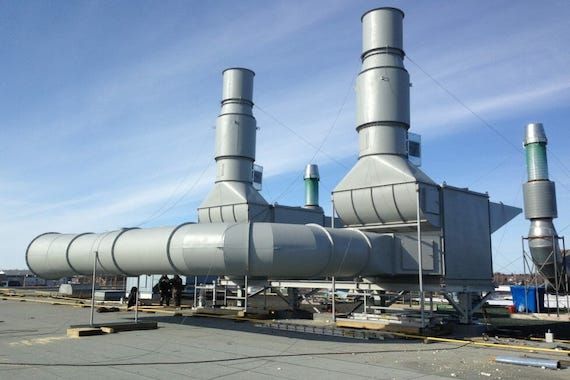SMEs: the “three Rs” according to Aéronergie
[ad_1]

A heat exchanger signed Aéronergie.
The inaction of States and companies is sometimes discouraging as the climate emergency is strong, but the work of an SME in Drummondville offers a glimmer of hope.
With more than 700 projects to its credit, Aéronergie has enabled its customers to save 13 million dollars (M$) in energy while avoiding the release of 64,000 tonnes of GHGs.
“All of our projects aim to reduce GHGs,” proudly says its owner, Carl Binette, in an interview. This is our mission.”
A key player for energy-intensive sectors
Its clients mostly operate industrial facilities, but the SME also serves businesses in the commercial and institutional sectors. Knowing that these sectors represent about 46% of energy consumption in Quebec, it is obvious that Aéronergie, which has about fifty employees, can play a key role in the transition.
The leader explains that his company’s interventions are based on three pillars. “We base ourselves on the three Rs, namely reducing at the source, recovering energy and replacing it,” he says.
Energy reduction is achieved in particular by installing tools to control temperature, CO2, humidity and other emissions. Recovery consists of distributing or reusing elsewhere in a building the heat given off by machines, such as industrial furnaces, compressors and electrical rooms. “We manufacture our own air exchangers, explains the founder of Aéronergie. You can adapt to temperatures as high as 1000 degrees Celsius.”
To replace the energy used, this SME created in 2011 builds solar thermal collectors affixed to the walls of the building which preheat the air to reduce energy consumption. Such an installation at Soprema, in Drummondville, only cost $35,000 in 2014 thanks to subsidies, for annual savings of $17,500 and 29 tonnes of GHGs.
It also designs « air curtains » which are ventilation equipment installed in front of exterior doors and factory ovens to considerably reduce air exchange between the exterior and the building or inside this one.
Not a question of money
Contrary to what one might think, saving is not the first factor that encourages companies to act.
“It’s rarely to reduce operating costs, says Carl Binette. It is often because it is too hot in summer and too cold in winter in the building or because the air quality is not good. Reducing GHGs is also decisive, because many companies have objectives in this direction.”
“However, the return on investment remains an important factor in decision-making,” he adds. In the industrial sector, it takes one to five years to achieve it, compared to three to five years in the commercial sector and five to seven years in the institutional sector. “There is therefore a way to serve the planet without an additional expense in the end,” notes Carl Binette. Even if investments are profitable more quickly in the industrial sector, companies in this sector are often the most hesitant to loosen the purse strings. “Due to production and market uncertainties, these companies are really thinking short-term and have limited cash,” Binette says.
However, he argues that for companies not wishing to take money out of their pocket, there are investment funds that finance decarbonization by paying for green projects and which are then reimbursed from the savings made.
The power of integration
Every year, Aéronergie carries out around fifty projects for around fifteen companies. « Our turnkey service is one of our great strengths, » notes the boss. We carry out diagnostics, design, manufacturing, installation and measurement after the work, in addition to managing grant applications.
We complete a project in less than a year, while other manufacturers take longer to manufacture the equipment alone.” It therefore allows its customers to avoid having to manage four people. « A $2.5 million project is $1.5 million with us, » he says. The one-stop-shop has a positive impact on costs and lead times.”
Although the majority of its revenue comes from Quebec, Aéronergie has won contracts in a dozen countries. Abroad, it uses integrators who do the installation, as was the case for Amazon and DHL warehouses in Germany. “Demand has tripled since COVID,” notes the boss. We are more aware that climate change has effects on humans, and the war in Ukraine has created an energy shock in Europe.
The future is therefore bright for this innovative company from Centre-du-Québec. And it is also a little more so for humanity thanks to her.
fbq('init', '1802611106632565');
fbq('track', "PageView");fbq('track', "ViewContent");
[ad_2]
Source link



